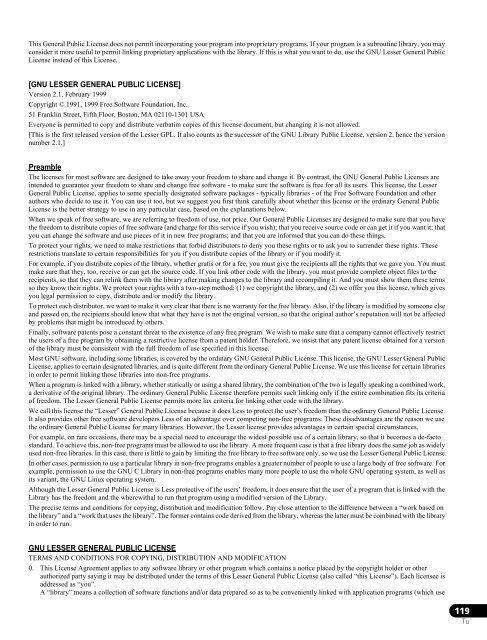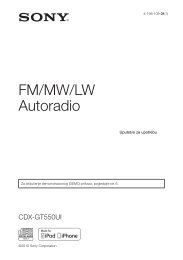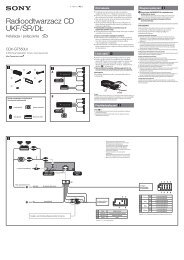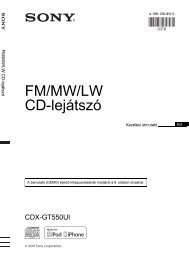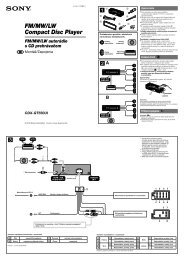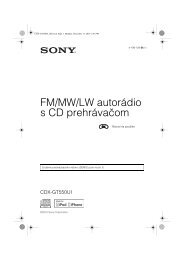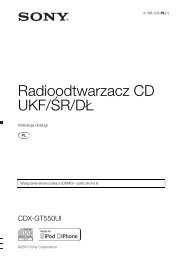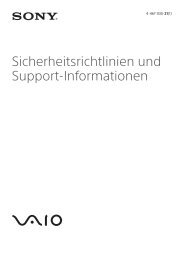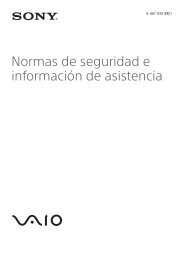Pioneer KRP-600A - User manual - turc
Pioneer KRP-600A - User manual - turc
Pioneer KRP-600A - User manual - turc
Create successful ePaper yourself
Turn your PDF publications into a flip-book with our unique Google optimized e-Paper software.
This General Public License does not permit incorporating your program into proprietary programs. If your program is a subroutine library, you may<br />
consider it more useful to permit linking proprietary applications with the library. If this is what you want to do, use the GNU Lesser General Public<br />
License instead of this License.<br />
[GNU LESSER GENERAL PUBLIC LICENSE]<br />
Version 2.1, February 1999<br />
Copyright © 1991, 1999 Free Software Foundation, Inc.<br />
51 Franklin Street, Fifth Floor, Boston, MA 02110-1301 USA<br />
Everyone is permitted to copy and distribute verbatim copies of this license document, but changing it is not allowed.<br />
[This is the first released version of the Lesser GPL. It also counts as the successor of the GNU Library Public License, version 2, hence the version<br />
number 2.1.]<br />
Preamble<br />
The licenses for most software are designed to take away your freedom to share and change it. By contrast, the GNU General Public Licenses are<br />
intended to guarantee your freedom to share and change free software - to make sure the software is free for all its users. This license, the Lesser<br />
General Public License, applies to some specially designated software packages - typically libraries - of the Free Software Foundation and other<br />
authors who decide to use it. You can use it too, but we suggest you first think carefully about whether this license or the ordinary General Public<br />
License is the better strategy to use in any particular case, based on the explanations below.<br />
When we speak of free software, we are referring to freedom of use, not price. Our General Public Licenses are designed to make sure that you have<br />
the freedom to distribute copies of free software (and charge for this service if you wish); that you receive source code or can get it if you want it; that<br />
you can change the software and use pieces of it in new free programs; and that you are informed that you can do these things.<br />
To protect your rights, we need to make restrictions that forbid distributors to deny you these rights or to ask you to surrender these rights. These<br />
restrictions translate to certain responsibilities for you if you distribute copies of the library or if you modify it.<br />
For example, if you distribute copies of the library, whether gratis or for a fee, you must give the recipients all the rights that we gave you. You must<br />
make sure that they, too, receive or can get the source code. If you link other code with the library, you must provide complete object files to the<br />
recipients, so that they can relink them with the library after making changes to the library and recompiling it. And you must show them these terms<br />
so they know their rights. We protect your rights with a two-step method: (1) we copyright the library, and (2) we offer you this license, which gives<br />
you legal permission to copy, distribute and/or modify the library.<br />
To protect each distributor, we want to make it very clear that there is no warranty for the free library. Also, if the library is modified by someone else<br />
and passed on, the recipients should know that what they have is not the original version, so that the original author’s reputation will not be affected<br />
by problems that might be introduced by others.<br />
Finally, software patents pose a constant threat to the existence of any free program. We wish to make sure that a company cannot effectively restrict<br />
the users of a free program by obtaining a restrictive license from a patent holder. Therefore, we insist that any patent license obtained for a version<br />
of the library must be consistent with the full freedom of use specified in this license.<br />
Most GNU software, including some libraries, is covered by the ordinary GNU General Public License. This license, the GNU Lesser General Public<br />
License, applies to certain designated libraries, and is quite different from the ordinary General Public License. We use this license for certain libraries<br />
in order to permit linking those libraries into non-free programs.<br />
When a program is linked with a library, whether statically or using a shared library, the combination of the two is legally speaking a combined work,<br />
a derivative of the original library. The ordinary General Public License therefore permits such linking only if the entire combination fits its criteria<br />
of freedom. The Lesser General Public License permits more lax criteria for linking other code with the library.<br />
We call this license the “Lesser” General Public License because it does Less to protect the user’s freedom than the ordinary General Public License.<br />
It also provides other free software developers Less of an advantage over competing non-free programs. These disadvantages are the reason we use<br />
the ordinary General Public License for many libraries. However, the Lesser license provides advantages in certain special circumstances.<br />
For example, on rare occasions, there may be a special need to encourage the widest possible use of a certain library, so that it becomes a de-facto<br />
standard. To achieve this, non-free programs must be allowed to use the library. A more frequent case is that a free library does the same job as widely<br />
used non-free libraries. In this case, there is little to gain by limiting the free library to free software only, so we use the Lesser General Public License.<br />
In other cases, permission to use a particular library in non-free programs enables a greater number of people to use a large body of free software. For<br />
example, permission to use the GNU C Library in non-free programs enables many more people to use the whole GNU operating system, as well as<br />
its variant, the GNU Linux operating system.<br />
Although the Lesser General Public License is Less protective of the users’ freedom, it does ensure that the user of a program that is linked with the<br />
Library has the freedom and the wherewithal to run that program using a modified version of the Library.<br />
The precise terms and conditions for copying, distribution and modification follow. Pay close attention to the difference between a “work based on<br />
the library” and a “work that uses the library”. The former contains code derived from the library, whereas the latter must be combined with the library<br />
in order to run.<br />
GNU LESSER GENERAL PUBLIC LICENSE<br />
TERMS AND CONDITIONS FOR COPYING, DISTRIBUTION AND MODIFICATION<br />
0. This License Agreement applies to any software library or other program which contains a notice placed by the copyright holder or other<br />
authorized party saying it may be distributed under the terms of this Lesser General Public License (also called “this License”). Each licensee is<br />
addressed as “you”.<br />
A “library” means a collection of software functions and/or data prepared so as to be conveniently linked with application programs (which use<br />
119<br />
Tu


